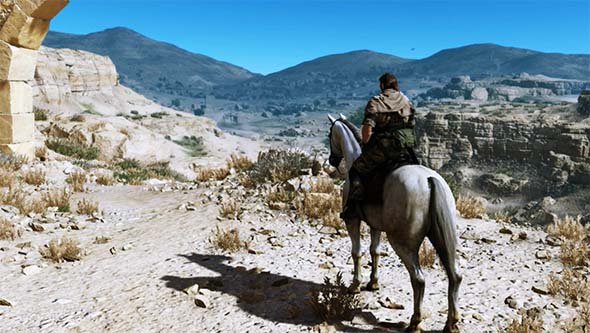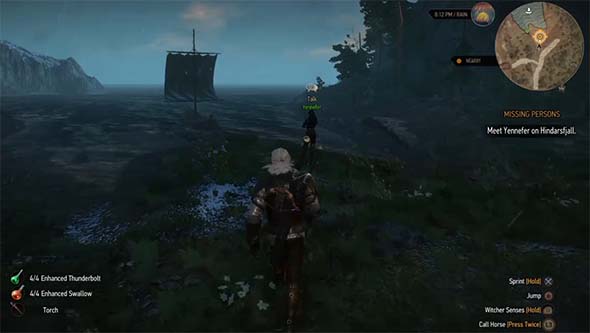My past two blog posts have been focused on open world gaming. These posts have been continuations of an earlier post about the narrative "limbo" that many open world games create via their quest structures. In the first post in this second series, I pointed out what I perceive to be a problem with open world games that insist on turning their sandbox worlds into little more than convoluted mission-select screens and collectible checklists. In the following post, I described some games that I think managed to make successful open worlds by including features or mechanics that made traveling through the space (or knowledge of the space) into a meaningful mechanic. This time, I want to go back to some of the games that I singled-out in the first post in this series, and brainstorm some ways that they could have made better use of the large spaces that their maps offered so that traveling around the world wouldn't become so boring later in the game.
But before I do that, I want to re-emphasize that I don't hate these games. They're just not very good at using their space, and that's what I'm criticizing. Well, the newer Assassin's Creed games have been pretty terrible. Anyway, I pick on games like Skyrim and The Witcher III a lot, but I like them just fine - I bought the DLC for both. I pick on them, not because I hate them, but because I do like them and I want them to get better (or for their sequels to get better). Rather, my objective here is to find ways for these games to make better use of the large, open spaces that they provide the player, so that exploring the map feels more mechanically relevant, more interesting, or more rewarding; and to feel less like a time-sink.
Games like Skyrim and The Witcher III have massive worlds, but do a poor job of utilizing the space.
Bethesda's Skyrim and Fallout titles, as well as CD Projeckt Red's Witcher III and Rockstar's Grand Theft Auto V, already have open worlds that transcend being simple, convoluted mission-select screens like games like Assassin's Creed and Metal Gear Solid V. They populate their worlds with little narrative world-building details that make their worlds feel alive and lived-in (even though they may feel stagnant). So what could a game like Skyrim or The Witcher III have done to improve its open world? [More]
1a284324-86e6-4bf6-90a4-dca665c348d9|1|5.0
Tags:open world, sandbox, game design, road trip, map, traversal, travel, cartography, geography, narrative, ludonarrative, ludonarrative dissonance, limbo, paradox, Kafkaesque, quest, Ubisoft, Bethesda, Rockstar Games, Beenox, Insomniac Games, Naughty Dog, Assassin's Creed, The Elder Scrolls, Skyrim, The Witcher 3, Grand Theft Auto, Grand Theft Auto V, The Last of Us, Spider-Man, web-swinging, comic book
Playing games like Skyrim, Grand Theft Auto, Assassin's Creed: Black Flag, The Witcher 3, Mad Max, Metal Gear Solid V, and other open-world games has made me increasingly weary of open-world gaming. Narrative-based, open world games like these suffer from a problem that I have started calling "open world limbo" (or "open world purgatory"). This is a sort of paradoxical offshoot of the concept of ludonarrative dissonance. The game's open world "sandbox" design seems to directly conflict with the narrative that the game is trying to tell. It specifically refers to the conflict between the story and the game's open world, rather than a conflict between the game's story and any particular game system(s). Generally, this manifests as the game designers setting the stakes so high that the player should feel pressured to progress the narrative, but the game's open world design never follows through with any real consequences for not progressing.

More and more big-budget games are going open world. is this a good thing?
This leads to problems in which the player can spend hours, weeks, or months doing tangential, or completely unrelated, tasks and pushing the game's story objectives down to the bottom of their priority list. For people who just like to play the game, this may not be much of a problem. They get a massive sandbox in which to do anything they want. That is actually one of the back-of-the-box selling point for most of these games.
But as one of those "games as art" kind of snobs, I also really like to have an engaging narrative that flows seamlessly with the gameplay. So if a game offers a narrative of any kind, you bet I'm going to judge the game based (at least in part) by how well that narrative works and how fully it is integrated into the core gameplay experience. And when a game tries to convince the player that they are destined to save the world from impending doom (as is often the case with big-budget, open world games), then I get really peeved when I find myself able to completely eschew that destiny in favor of picking flowers and peddling salvaged bandit armor for the next 100 hours.
A world in stasis
The source of most of the "limbo" comes down to the fact that these games' worlds (despite being big and detailed) often feel static and devoid of life. They don't change on their own. No one seems to have any sense of agency, and nothing ever happens unless the player is there to make it happen. Quest-givers sit around outside their house forever waiting for the player to come along and help them kill the wolves that are attacking their livestock, or find their missing heirloom, or deliver their special package to someone in the next town over, or whatever else they want done. The situation never resolves itself, the quest-giver never gets tired of waiting for you and hires another adventurer, those wolves never manage to eat all the remaining livestock, the heirloom never shows up in lost-and-found, and the statute of limitations on that package never expires. Emergencies can always wait [indefinitely] for the player to resolve them.

Quest-givers will wait forever for the player character to show up and solve their problems.
But worst of all is that the big, bad villain (if there is one) just doesn't feel very threatening or intimidating if he (or she, or it) isn't actually doing anything to actively antagonize the player or the world... [More]
ced5d1e2-3408-4ea8-8245-ca32f7affbe1|4|4.8
Tags:open world, limbo, option paralysis, narrative, ludonarrative, ludonarrative dissonance, consequences, punctuated equilibrium, quest, The Elder Scrolls, Oblivion, Skyrim, The Witcher 3, Grand Theft Auto, Final Fantasy, Mass Effect, The Legend of Zelda, Majora's Mask, Shadow of Mordor, Fallout, Sid Meier's Civilization, Cities: Skylines
I came across some interesting articles today relating to video games, and I'd like to share my thoughts about them with you.
[More]
|

| 12 | | | | | | | 60 | | 11 | | | | | | | 55 | | 10 | | | | | | | 50 | | 09 | | | | | | | 45 | | 08 | | | | | | | 40 | | 07 | | | | | | | 35 | | 06 | | | | | | | 30 | | 05 | | | | | | | 25 | | 04 | | | | | | | 20 | | 03 | | | | | | | 15 | | 02 | | | | | | | 10 | | 01 | | | | | | | 05 |
|